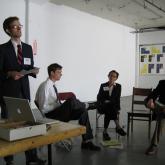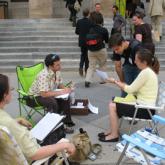Week 30: The Think Tank that has yet to be named
Hi Everyone,
This Tuesday is another event in a year-long series of weekly conversations and exhibits in 2010 shedding light on examples of Plausible Artworlds.
This week we’ll be talking with Jeremy Beaudry from the anomalously named “Think Tank that has yet to be named”, a sort of roving creative public policy institute that initiates site-specific conversations, performative actions, and educational projects questioning contemporary urban issues wherever they happen to crop up. Specifically, the group is concerned with how artists and their creative practices so often end up embroiled in urban (re)development strategies, gentrification and the general homogenization of urban space.
http://www.thinktank.boxwith.com/
Since its inception in 2006, the Think Tank’s permanently open-ended denomination draws particular attention each time it is enunciated to the perils and pitfalls of name giving — above all naming’s inherent tendency to a assign a fixed identity, something any would-be plausible artworld must be wary of. Naming is a powerful political act when it makes a previously unauthorized body appear; yet perhaps only “as-yet-to-be-naming” can perpetuate this political potential over time. As Jeremy Beaudry, Director of the Dept for the Investigation of Meaning, explains,
the Think Tank is comprised of several Departments, each led by a single Director. There can be no Department without a Director, and there can be no Director without a Department. Directors are both autonomous agents and cooperative collaborators. In this respect, the Think Tank has no members, only directors. The declaration of a directorship in a Department amounts to a statement of that individual’s bias and agenda. Nothing is more offensive to the Think Tank than the pretense of neutrality.
The list of names of the Think Tank’s Departments (past and present) wryly makes the point:
- Dept. for the Investigation of Authenticity (DIA)
- Dept. for the Investigation of Cross-Pollination (DICP)
- Dept. for the Investigation of Documentary Subjectivity (DIDS)
- Dept. for the Investigation of Ecological Subjectivity (DIES)
- Dept. for the Investigation of Failure (DIF)
- Dept. for the Investigation of InterSubjectivity (DIIS)
- Dept. for the Investigation of Meaning (DIM)
- Dept. for the Investigation of Metaphorical Agency (DIMetA)
- Dept. for the Investigation of Neutrality & Palatability (DINP)
- Dept. for the Investigation of Radical Pedagogy (DIRP)
- Dept. for the Investigation of ReHumanization (DIRH)
- Dept. for the Investigation of the Structure of Expectations (DISE)
- Dept. for the Investigation of Tactical Education (DITE)
- Dept. for the Investigation of Tactical and Strategic Alignment (DITSA)
- Dept. for the Investigation of the Unmentionable and the authentic
- Dept. for the Investigation of the Unthinkable (DIUT)



